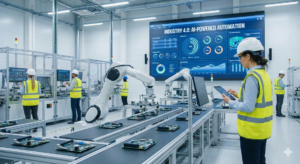How Artificial Intelligence Is Enabling Human-Like Conversations to Transform Customer Service

How Artificial Intelligence Is Enabling Human-Like Conversations to Transform Customer Service
There is a significant probability that your first “hello” on a website was not responded by a live being if you have recently submitted a request for assistance on that website. On the other hand, the chat could have been an unexpectedly pleasant, natural, and beneficial experience. This is not a coincidence; rather, it is the outcome of artificial intelligence changing customer assistance, on a chat-by-chat basis.
Chatbots and virtual agents powered by artificial intelligence are no longer restricted to providing cold, predetermined responses. The advancements that have been made in natural language processing and machine learning have made it possible for them to now have conversations that seem incredibly human. They are able to provide support experiences that are immediate, consistent, and often really enjoyable.
However, what really is going on behind the scenes, and what does this imply for both the companies and their customers? So, let’s take a more in-depth look.
A Step Beyond the Traditional Chatbot Approach
Have you ever thought back to the early days of customer service bots? In the event that you typed a query, the bot would either entirely misinterpret it or respond with a generic response that was not helpful. These bots operate according to a set of rules, depending on pre-written responses that are triggered by certain phrases.
AI chatbots of today operate in a different manner. They make use of massive language models and real-time context analysis in order to comprehend the purpose of your inquiry, regardless of whether it is expressed in a casual manner or with some degree of imperfection. They are also able to ask clarifying questions, modify their tone, and even understand when they are out of their depth, which allows them to transfer you to a human agent in a smooth manner.
What is the end result? Conversations are less robotic and more like having a conversation with a helpful assistant who is listening to you and understands the difficulty you are having.
Rapidity, reliability, and availability around the clock
One of the most significant benefits of using AI for customer service is that it is readily available. Because AI agents do not need a lunch break or a weekend off, clients are able to get assistance whenever they need it, regardless of whether it is midnight on a Sunday or the middle of a hectic weekday.
The use of AI also guarantees accurate responses. Every every consumer receives the same precise information, which helps to alleviate the aggravation that might arise from multiple agents providing contradictory replies. As a result of the fact that AI is able to instantaneously retrieve information from knowledge bases, past discussions, or order systems, it often offers responses more quickly than a human user could enter them.
Assuming Responsibility for the Repeated Tasks
Human support teams sometimes devote a significant portion of their day to providing answers to the same fundamental concerns, such as “Where is my order?” “What is your policy regarding returns?” “How do I know how to reset my password?” Artificial intelligence chatbots are particularly adept at answering these kind of repetitious questions, which frees up human agents to deal with more complicated or delicate matters that need empathy and critical thought.
AI helps support teams become more strategic by taking care of regular tasks, which frees up human agents to focus on what they are most skilled at doing, which is building connections and finding solutions to specific problems.
Experimenting and gaining knowledge over time
Not only can modern artificial intelligence respond to inquiries, but it also learns from each encounter it has. It has the ability to modify and improve its replies since it is able to observe how individuals ask inquiries, what solutions are effective, and where talks get stuck.
It follows that customer service is not a static service. Systems that are driven by artificial intelligence grow more intelligent with time, better able to comprehend slang or regional language, and faster to provide the appropriate response. Additionally, businesses are able to acquire insights into typical pain areas, which assists in the development of changes to goods or services.
Bringing together artificial intelligence and human interaction
Even while artificial intelligence has gotten more sophisticated, the goal is not to replace human assistance; rather, it is to improve it. A hybrid strategy is created by the most effective systems:
- AI is able to handle questions that are basic, rapid, and big in volume.
- When there are difficult inquiries, emotional concerns, or unusual circumstances, human agents come in to help.
- Customers get the benefits of quicker initial responses and more seamless transitions to individuals when they are required. As a result, businesses are able to improve their productivity and scale their assistance without having to continually expand their workforce.
Support for Customers Will Be More Friendly in the Future
Artificial intelligence-driven discussions are transforming the way customer service is delivered. Whether it be throughout the day or night, consumers may now enjoy encounters that are prompt, courteous, and even customized. Gone are the days of lengthy wait times, interminable phone menus, and responses that were copied and pasted.
It is a change that extends beyond the realm of technology. Despite the fact that the first answer is provided by a computer, it is about reinventing assistance as something that is proactive, helpful, and human in spirit.
The further development of artificial intelligence is expected to result in the emergence of ever more natural conversations, wiser recommendations, and a more intimate combination of automation and empathy, which will bring consumers and companies closer together than they have ever been before.




